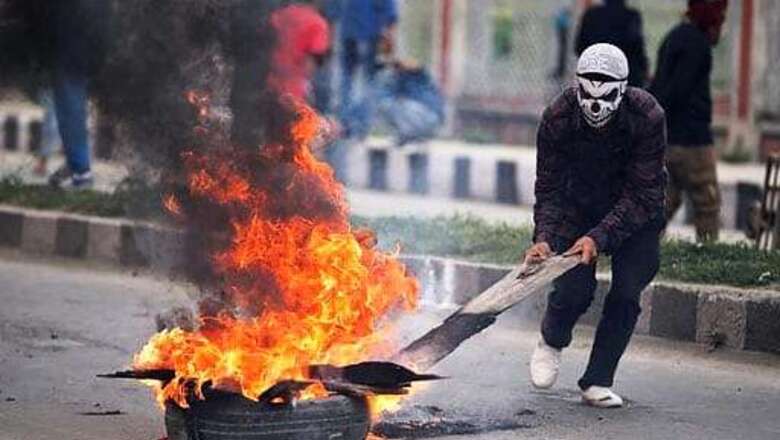
views
Dialogue, they say, is always better than a deadlock. Though in the case of Kashmir, the institution of dialogue stands discredited for variety of reasons.
Indeed, the appointment of former Intelligence Bureau (IB) chief Dineshwar Sharma as New Delhi’s political representative, holding the rank of Cabinet Secretary, for ‘dialogue’ with ‘stakeholders’ in Jammu and Kashmir is likely to be packaged as good news by the BJP.
But it is not.
On ground zero, there is more scepticism than hope. And there are valid reasons behind this cynicism.
Let us face a simple fact: Successive governments in New Delhi have failed the people of Kashmir on many previous occasions. It is New Delhi which is primarily responsible for harming the reputation of the institution called dialogue.
With its history of broken promises and time buying tactics, New Delhi has also shattered confidence of the Kashmiris in any dialogue process and thus killed hope.
After the bloody summer of 2010 that left over 120 civilians dead in the Valley, most of them teenage boys, the United Progressive Alliance (UPA-II) government in New Delhi appointed the late Dilip Padgaonkar, MM Ansari and Professor Radha Kumar as three interlocutors for Kashmir in October.
The file containing their report and recommendations is regaled to the dusty shelves of the North Block along with the ones prepared by KC Pant and present Governor of Jammu and Kashmir NN Vohra in the past. What happened to the recommendations made by the Working Groups constituted by former Prime Minister Manmohan Singh?
One may also like to ask what happened to the Autonomy Resolution unanimously passed by J&K Legislative Assembly in 2000. All these experiences are indicative of the practice of New Delhi to bury the Kashmir issue under the carpet in the garb of fresh dialogue.
The problem with the latest initiative is that the BJP government has once again chosen ambiguity over clarity. New Delhi has failed to identify the stakeholders and the mandate given to Sharma is also not clear.
Another serious problem with the initiative is that the BJP wants to hoodwink the country by selling a flawed idea that its muscular policy has worked wonders in Kashmir Valley.
True that the J&K Police, Indian Army and paramilitary Central Reserve Police Force (CRPF) have killed over 150 armed militants, including eight top commanders of Lashkar and Hizb, from January to September this year. However, another bitter fact is that this year has been the bloodiest for J&K Police in the last five years as the department lost 28 of its personnel in various attacks carried out by militants in several parts of Kashmir. Since the eruption of the armed conflict in 1989, J&K Police have lost 1,622 personnel.
The BJP government is falsely claiming ‘success’ by shrinking the space of the All Parties Hurriyat Conference (APHC) and breaking the bone of armed militancy, but the fact is that pro-India politicians by their own admission are finding themselves at the precipice of complete irrelevance on Kashmir’s turf.
A near-complete boycott of the last bye-elections in Srinagar-Budgam parliamentary constituency in April this year is a case in point. There was 7.14 % voting on 9 April in Srinagar and only 2% on the day of re-polling in Budgam.
“You are witnessing political radicalisation in Kashmir because of New Delhi’s arrogance,” a pro-India politician told me at that time, adding that “New Delhi’s treatment of Kashmiris has made people lose confidence in mainstream politics”. The PDP-BJP government, while tooting the horn of success of muscular policy, has failed to conduct bye-polls in south Kashmir’s Anantnag parliamentary constituency since last year.
Besides, many PDP workers and former Sarpanches continue to be killed and their houses ransacked by militants in Tral, Pulwama, Shopian, Kulgam and Anantnag areas in south Kashmir.
J&K’s beleaguered Chief Minister Mehbooba Mufti has welcomed Rajnath Singh’s initiative. But doing so is her political compulsion rather than any genuine belief that the new idea will reap any dividends. Given the bitter experiences of the past, the Hurriyat is adopting a wait and watch policy for now.
The fact is no peace is possible in Kashmir if Pakistan is not involved in the dialogue process.
Moreover, let us not miss the larger international context.
Rex Tillerson, the US Secretary of State, is visiting both India and Pakistan. He also paid a surprise visit to war-torn Afghanistan, a country from where America wants a dignified exit which is impossible without Pakistan’s help. America needs Pakistan in Afghanistan. Is there a Tillerson effect?
New Delhi must show flexibility and learn some lessons from the Northern Ireland example. It should allow third party mediation in Kashmir for a peaceful Kashmir and prosperous South Asia. If the Good Friday Agreement can work in Northern Ireland why can’t a similar initiative work in Kashmir?
Only an unambiguous and sincere initiative on Kashmir will succeed. All attempts of selling old wine in new bottle will are destined to fail!
(Author is a journalist and political analyst from Srinagar. Views are personal)



















Comments
0 comment